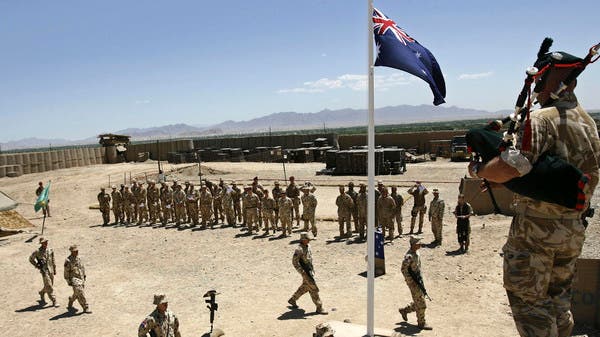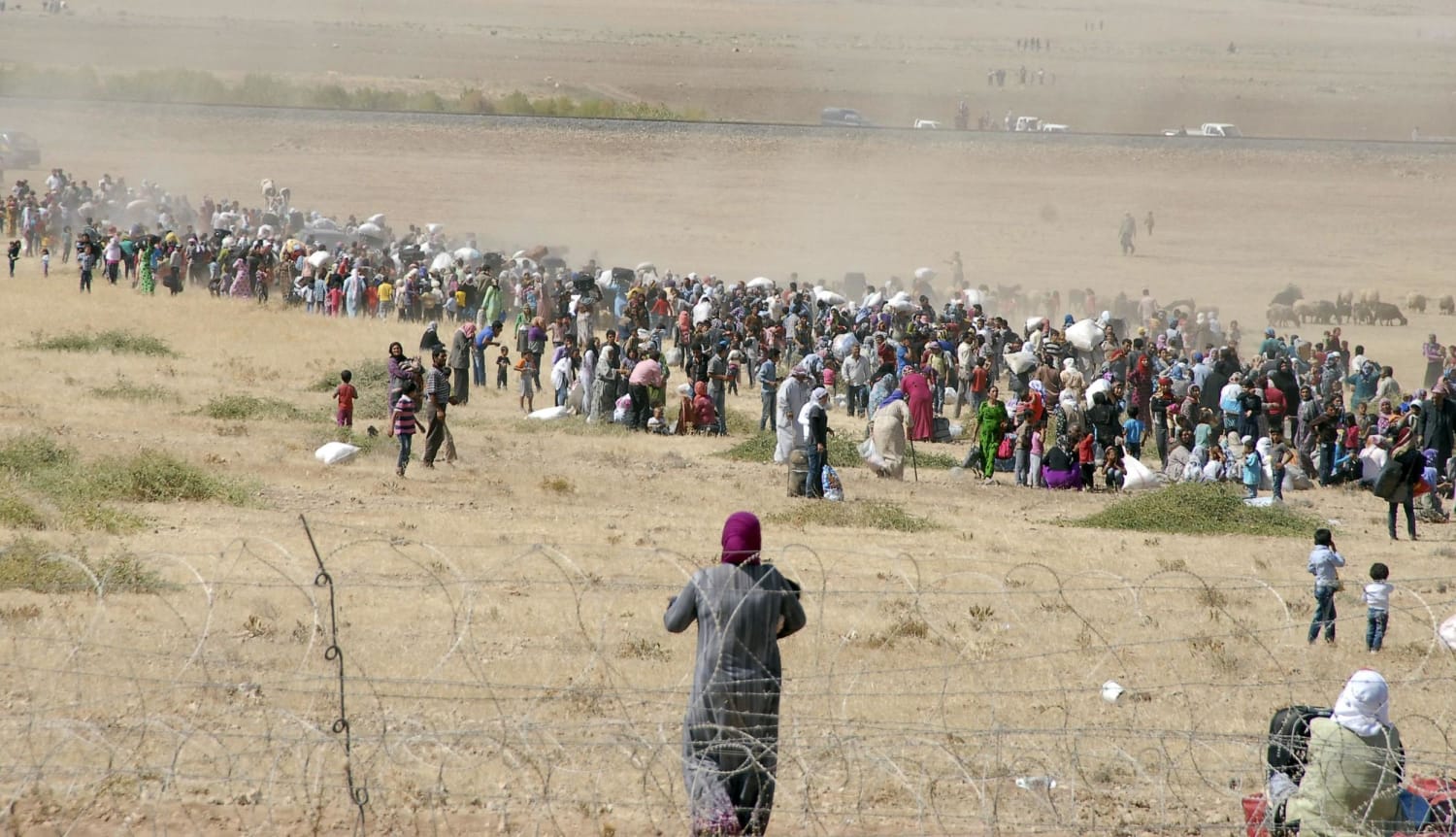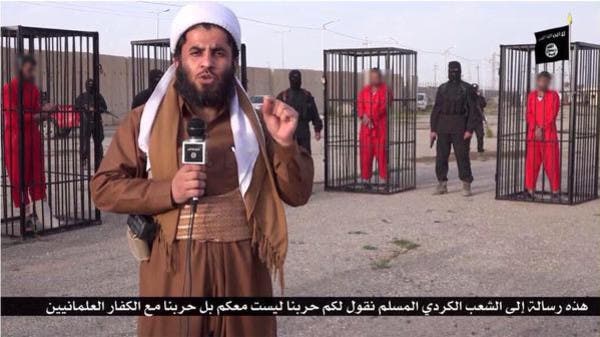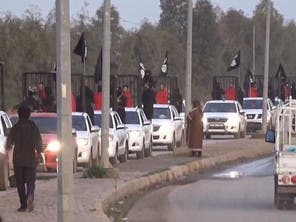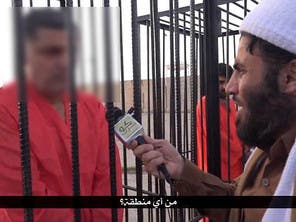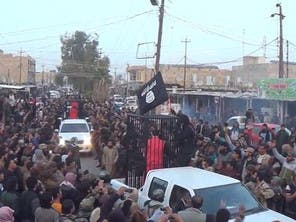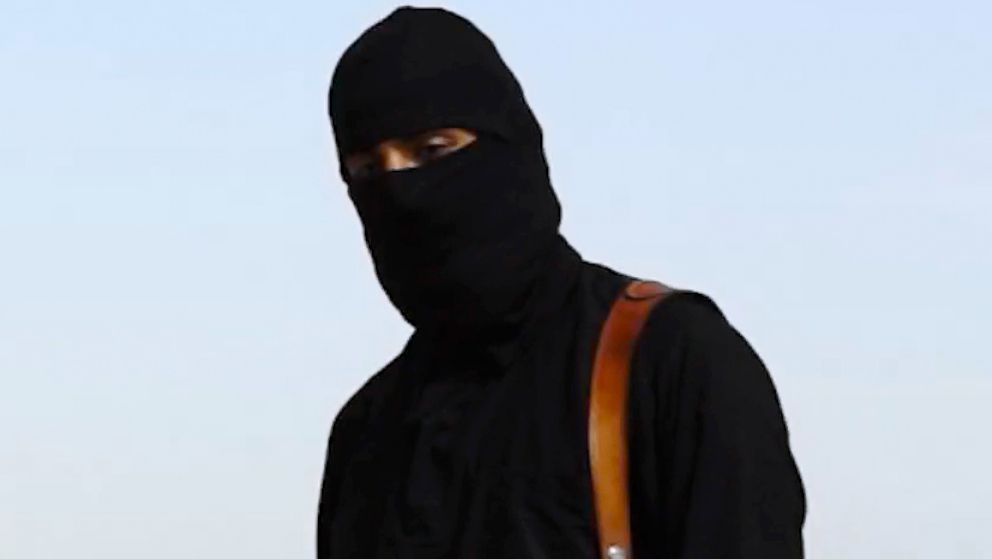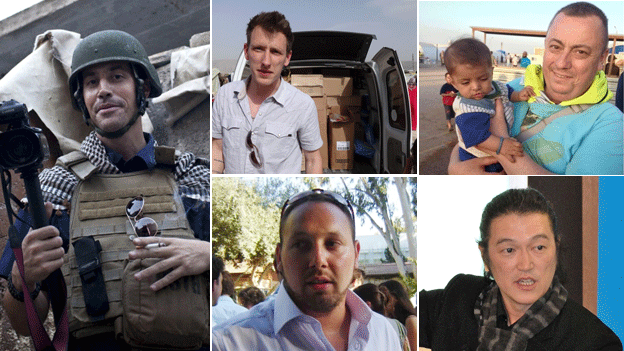'Jihadi John': Haines widow wants militant caught alive
The widow of a man killed by a masked Islamic State militant known as "Jihadi John" says she wants him caught alive.
Dragana Haines says the "last thing" she wants for the man who killed her husband, British aid worker David Haines, is an "honourable death".
The militant, pictured in the videos of the beheadings of Western hostages, has been named as Mohammed Emwazi, a Kuwaiti-born Briton from west London.
Mr Haines' daughter said she wanted to see "a bullet between his eyes".
Emwazi, who is in his mid-20s and was previously known to British security services, first appeared in a video last August, when he apparently killed the US journalist James Foley.
Dragana Haines, wife of slain hostage David: "I hope he will be caught alive... He needs to be put to justice"
He was later thought to have been pictured in the videos of the beheadings of Mr Haines, US journalist Steven Sotloff, British taxi driver Alan Henning, and American aid worker Abdul-Rahman Kassig, also known as Peter.
Mrs Haines told the BBC she wanted him to be caught alive and not have an "honourable death" by being killed in action.
She added: "I think he needs to be put to justice, but not in that way."
(Clockwise from left) Islamic State victims James Foley, Abdul-Rahman (Peter) Kassig, Alan Henning, Kenji Goto and Steven Sotloff
However Mr Haines' daughter, Bethany, told ITV News: "I think all the families will feel closure and relief once there's a bullet between his eyes."
A spokesman for the family of Steven Sotloff said: "We want to sit in a courtroom, watch him sentenced and see him sent to a super-max prison."
Mr Foley's mother Diane
told the Times that she forgave her son's killer.
"It saddens me, [Emwazi's] continued hatred," she said. "He felt wronged, now we hate him - now that just prolongs the hatred. We need to end it.
"As a mum I forgive him. You know, the whole thing is tragic - an ongoing tragedy."
'The Beatles'
In each of the videos, the militant appeared dressed in a black robe with a black balaclava covering all but his eyes and top of his nose.
Speaking with a British accent, he taunted Western powers before holding his knife to the hostages' necks, appearing to start cutting before the film stopped. The victims' decapitated bodies were then shown.
Earlier this month, the militant featured in a video in which the Japanese journalist Kenji Goto appeared to be beheaded.
Hostages released by IS said he was one of three British jihadists guarding Westerners abducted by the group in Syria. They were known collectively as "the Beatles".
Mohammed Emwazi timeline:
- 1988: Born in Kuwait, moves to UK in 1994
- 2009: Completes computing degree at University of Westminster
- Aug 2009: Travels to Tanzania with two friends, he says for safari, but refused entry at Dar es Salaam. Put on flight to Amsterdam. After questioning there, returns to Dover
- Sept 2009: Travels to Kuwait to stay with father's family
- July 2010: Returns to UK for short stay but told he cannot return to Kuwait as visa denied
- 2012: Passes Celta English language teaching course
- 2013: Changes name by deed poll to Mohammed al-Ayan. Tries to travel to Kuwait but is stopped. Disappears. Parents report him missing. Police tell family four months later he has entered Syria
In a news conference, Asim Qureshi, the research director of the London-based lobby group Cage, which had been in contact with Emwazi over a number of years, detailed the difficulties Emwazi had faced with security services in the UK and overseas.
Mr Qureshi said Emwazi, who is understood to be about 27, had been "extremely kind, gentle and soft-spoken, the most humble young person I knew".
He added that Emwazi travelled to Tanzania in May 2009 following his graduation in computer programming at the University of Westminster.
Mr Qureshi said he and two friends had planned to go on a safari but once they landed in Dar es Salaam they were detained by police and held overnight.
Emwazi told Cage he was subsequently "harassed" by security services and later told the charity he was "witnessing perceived injustices everywhere".
But Rafaello Pantucci, author of We Love Life As You Love Death, said the suggestion the security services may have driven Emwazi to carry out his killings was "disproportionate".
He said: "Security services asking questions and making your life a little bit difficult and ending up murdering people in this very cold-blooded way seems a very disproportionate causal link."
Analysis: Frank Gardner, BBC News
US and British counter-terrorism officials discovered the identity of "Jihadi John" as far back as last September. The FBI, Britain's MI5 and other intelligence agencies used a combination of voice recognition software, interviews with former hostages and on-the-ground research in London to build up a profile of the man now revealed to be Mohammed Emwazi.
They have always declined to reveal the name for "operational reasons". Now that it's out in the public domain, it's emerged that Emwazi was well-known to MI5 and that it even tried to recruit him as an informer, years before he went off to Syria to eventually join Islamic State.
The practice by intelligence agencies of approaching jihadist sympathisers to work for them is likely to continue. It's believed both Britain and the US have informers inside the Islamic State "capital" of Raqqa. Yet this seems to have been little help in stopping the actions of Mohammed Emwazi, or bringing him to justice.
Emwazi then ended up flying to Amsterdam, in the Netherlands, where he claimed to be met by British intelligence agents from MI5 who accused him of trying to travel to Somalia, where the jihadist group al-Shabab operates. He denied the accusation and said the agents had tried to recruit him before allowing him to return to the UK.
In early 2013, at his father's suggestion, Emwazi changed his name by deed poll to Mohammed al-Ayan, Cage said.
Emwazi was believed to have travelled to Syria around 2013 and later joined IS, which has declared the creation of a "caliphate" in the large swathes of Syria and neighbouring Iraq it controls.
A spokeswoman for Prime Minister David Cameron would not confirm or deny the latest reports, adding that the police and security services were working hard to find those responsible for the murder of the British hostages.
British police have not commented on his identity, citing ongoing inquiries.
Jihadi John sightings
- August 2014: Video in which US journalist James Foley is apparently beheaded
- 2 September 2014: Video in which US journalist Steve Sotloff is apparently beheaded
- 13 September 2014: Video in which British aid worker David Haines is apparently beheaded
- October 2014: Video in which British aid worker Alan Henning is apparently beheaded
- November 2014: Video in which Jihadi John is shown killing a Syrian soldier in a mass beheading, which also shows body of US aid worker Abdul-Rahman Kassig, also known as Peter Kassig
- 20 January 2015: Video in which Jihadi John is seen standing alongside two Japanese hostages and demanding a ransom in exchange for their release
- 31 January 2015: Video released appearing to show Jihadi John beheading Japanese hostage Kenji Goto
BBC News - &[HASHTAG]#039[/HASHTAG];Jihadi John&[HASHTAG]#039[/HASHTAG];: Haines widow wants militant caught alive
